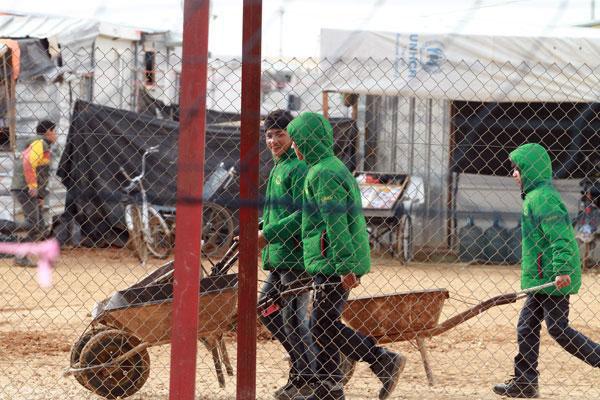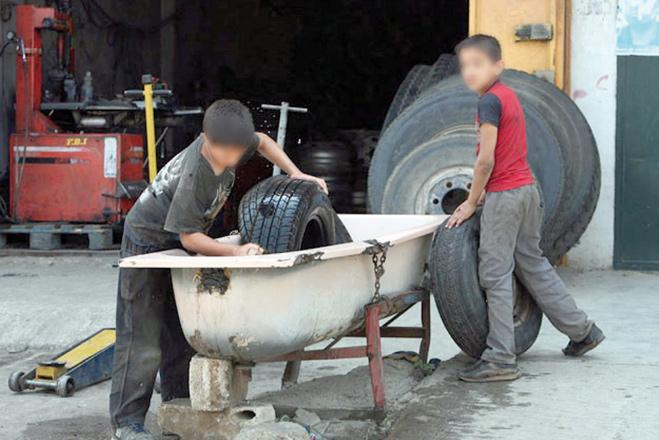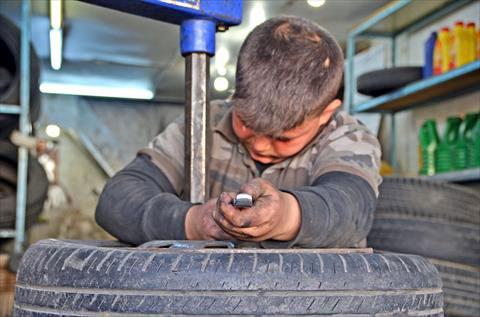You are here
Campaign to curb child labour launched amid reports of rising rates
By Ana V. Ibáñez Prieto - Jun 24,2018 - Last updated at Jun 24,2018

Fines from JD300 to JD500 will be imposed against all employers who violate the provisions of the law on the employment of juveniles (File photo)
AMMAN — The Ministry of Labour on Sunday launched an “extensive” inspection campaign aimed at combating child labour on all industrial, service and commercial establishments across the Kingdom, amid reports of “doubled rates” of the phenomenon.
The campaign, which will run for a month, will ensure the application of the provisions of the Labour Law on child work and prevent the operation of youth in “dangerous, burdensome or harmful work spaces”, the ministry’s media directorate said in a statement.
Fines from JD300 to JD500 will be imposed against all employers in violation of the provisions of the law on the employment of juveniles, ministry spokesperson Mohammad Al Khatib told The Jordan Times, in addition to “progressive measures” ranging from the issuance of warnings to the complete closure of the establishments in conflict with the law.
The official also highlighted “the importance of the employers’ commitment to not hire children under the legal working age”, calling upon families to “shoulder their responsibilities and protect their children”.
Maha Homsi, chief of child protection at UNICEF Jordan, commended “the commitment and efforts of the Ministry of Labour in leading the national campaign to end child labour in the Kingdom,” expressing that “it is our collective responsibility to rescue children as quickly as possible from the worst forms of labour”.
“We continue to work closely with the ministries of labour, social development, education, interior, the Family Protection Department, the National Council for Family Affairs, the International labour organisation [ILO] and the civil society to provide case management services and referrals to vulnerable children engaged in child labour and their families, so that the children can access learning and necessary care and support to achieve their full potential,” Homsi added.
‘Reality stronger than policies’
During the first half of 2018, the Ministry of Labour has dealt with a total of 105 cases of child labour, recorded 89 violations of the Labour Law and issued 85 warnings to employers.
But despite the efforts undertaken by the government, child labour rates have roughly doubled as compared to pre-regional crises figures, Save the Children warned in its End of Childhood Index of 2018.
In 2016, over 76,000 children were working in the Kingdom, according to the latest figures issued by the ILO in cooperation with the Ministry of Labour, 45,000 of whom were performing tasks under hazardous conditions.
“The reality of the social and economic conditions of children forced into labour is stronger than the policies and laws aimed at preventing it,” a position paper by the Phenix Centre for Economic and Informatics Studies said earlier this month, warning that the Jordanian legislative provisions condemning child labour have not curtailed the expansion of the issue in the Kingdom over the past years.
“This inspection campaign is in the right direction to curb the steady expansion of child labour,” Director of the Phenix Centre Ahmad Awad commented on the ministry’s announcement, adding that “although this is required, we must focus more on the adjustment of the economic and social policies in order to reduce the spread of poverty — which is the main reason behind the increasing child labour rates”.
The issue was also addressed by Tamkeen Fields for Aid in a statement released on the occasion of the World Day Against Child Labour, where the organisation warned that “the rights of children are still being violated despite the progress made in the past years in tackling the phenomenon”.
“It is not the first time the Ministry of Labour conducts an inspection campaign of these characteristics and that is always positive,” Tamkeen Director Linda Kalash told The Jordan Times, adding that “however, even if they prevent it, it is likely that these children will end up working again in other establishments”.
“This is why it is essential for the ministry to start identifying and addressing the reasons why these children engage with the labour market,” she continued, pointing out issues such as the financial burden that pushes families to send their children to work and the lack of education.
Related Articles
AMMAN — The Jordanian legislative provisions condemning child labour have not curtailed the expansion of the issue in the Kingdom over the p
AMMAN — The government must implement laws and policies to counter child labour, which has tripled in Jordan over the last decade, organisat
AMMAN — On the occasion of the World Anti-Child Labour Day on Wednesday, the Labour Ministry on Tuesday announced that it has dealt with 197




















